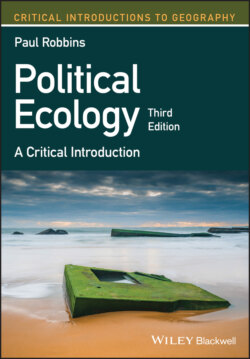Читать книгу Political Ecology - Paul Robbins - Страница 30
The Determinist Context
ОглавлениеYet such research was by no means the norm. For the most part, early geography and nascent anthropology were the tools of social and political control, reproducing the political and ecological order that critical human–environment researchers would later challenge and undermine. Linking environment to society through a tradition of environmental determinism, scientific and field researchers were servants of colonialism and empire.
Rooted in the theories of nineteenth‐century geographer Friedrich Ratzel and championed later in North America by the influential researchers William Morris Davis, Ellsworth Huntington, and Ellen Churchill Semple, the determinist approach maintained that geographic influences determined human capabilities and cultures, with its practitioners attempting to codify that thesis into scientific practice. Huntington was perhaps its most prolific exponent: “Today a certain peculiar type of climate prevails wherever civilization is high. In the past the same type seems to have prevailed wherever a great civilization arose. Therefore, such a climate seems to be a necessary condition of great progress” (Huntington 1915, p. 9). The empirical vacuousness of this thesis need not be belabored here. In even simple analysis, European and American environments have proved no more productive or inspiring for human life than any other (Blaut 1999, 2000). Where confronted with contradiction (e.g., “high” civilization in “bad” climate), Huntington and his colleagues generally retreated behind “complex” and “competing” factors and poorly defined trajectories of climatic change, while harsh climates were simultaneously used to explain the ingenuity of some groups and the cultural limits of others.
The implication of this theory in the perpetuation of global, imperial, racist rule by Euro‐Americans should be immediately evident. By even asking the question “why are Anglos more productive, civilized, and advanced?” the fallacious assumptions have already been made that first, they are, and second, it has to do with something inherent in the place or people involved, rather than being a consequence of historical and geographical interactions with the rest of the world. And in “scientifically” attempting to untangle the ancient question of heredity or environment, “Race or Place?” as Huntington put it in his classic volume Civilization and Climate, the fundamental political and historical questions of domination, colonization, and extermination are erased. In the answer, moreover, came a confident and scientific rationale for Euro‐American dominance – it's only natural. Indeed, by rendering colonial domination an environmental inevitability, the practice of colonialism comes to appear apolitical.
The research implications for this kind of work were equally stultifying. By assuming the role of nature to be a determinant, fixed, and unidirectional influence, the complex influences of humanity upon non‐human systems were lost altogether. As a result, nature was seen as a one‐way force that determined cultural development, even at the very moment that the world of nature, ironically, was transforming under the processes of industrialization. Despite deleterious changes in air, land, and water resulting from economic and political developments of the era (smokestack industries, urban waste, and deforestation), nature was viewed during this period as beyond human influence.
